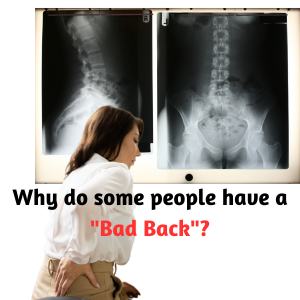
Some people may experience a “bad back” due to a variety of factors, many of which are related to the complex structure of the spine and its supporting muscles, ligaments, and discs. Here are some common reasons why people might have back issues:
- Poor Posture: Prolonged periods of poor posture, such as slouching while sitting or standing, can strain the muscles and ligaments of the back, leading to discomfort and pain.
- Muscle Strain: Overexertion, lifting heavy objects improperly, or sudden movements can cause muscle strains in the back. These strains can lead to pain and discomfort.
- Herniated Disc: A herniated or slipped disc occurs when the soft cushioning material between the vertebrae ruptures or bulges, putting pressure on nearby nerves and causing pain.
- Degenerative Disc Disease: Over time, the discs between the vertebrae can naturally deteriorate, leading to reduced cushioning and potential pain.
- Arthritis: Conditions like osteoarthritis and ankylosing spondylitis can cause inflammation in the joints of the spine, resulting in pain and stiffness.
- Sciatica: Compression or irritation of the sciatic nerve, which runs from the lower back down to the legs, can cause pain, numbness, and tingling that radiates down the leg.
- Structural Abnormalities: Some people are born with structural abnormalities in the spine, such as scoliosis (curvature of the spine), which can lead to pain and discomfort. Think of structural abnormalities as a reason that someone goes to see a chiropractor nearby.
- Medical Conditions: Certain medical conditions, like kidney stones or infections, can cause referred pain that is felt in the back.
- Injuries: Traumatic events like falls, car accidents, or sports injuries can cause damage to the back, resulting in pain and discomfort.
- Weight and Fitness: Being overweight or having weak core muscles can lead to added stress on the spine, contributing to back pain.
- Lifestyle Factors: Sedentary lifestyles, lack of exercise, and poor ergonomics at work or while lifting objects can increase the risk of developing back issues.
- Genetics: Some people may have a genetic predisposition to certain spine-related conditions.
It’s important to note that back pain can vary widely in severity and duration. If someone is experiencing persistent or severe back pain, it’s recommended to consult a healthcare professional for a proper diagnosis and treatment plan. Treatment options may include physical therapy, spinal alignment using chiropractic adjustments, pain management, medication, lifestyle changes, and in some cases, surgery.
